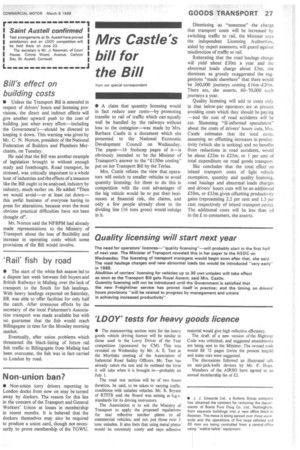Mrs Castle's bill for the Bill
Page 29

If you've noticed an error in this article please click here to report it so we can fix it.
from our special correspondent
• A claim that quantity licensing would in fact reduce user costs—by promoting transfer to rail of traffic which can equally well be handled by the railways without loss to the consignor—was made by Mrs. Barbara Castle in a document which she presented to the National Economic Development Council on Wednesday. The paper-16 foolscap pages of it—is obviously intended to be the Minister of Transport's answer to the "£150m costing" put on her Transport Bill by the Tories.
Mrs. Castle refutes the view that operators will switch to smaller vehicles to avoid quantity licensing; for them to do this in competition with the cost advantages of the big vehicle would be to put their businesses at financial risk, she claims, and only a few people already close to the dividing line (16 tons gross) would indulge in it. Dismissing as "nonsense" the charge that transport costs will be increased by switching traffic to rail, the Minister says the independent Licensing Authorities, aided by expert assessors, will guard against misdirection of traffic to rail.
Reiterating that the road haulage charge will yield about £30m a year and the abnormal loads charge about £3m, she dismisses as grossly exaggerated the suggestions "made elsewhere" that there would be 260,000 journeys costing £16m—£20m. There are, she asserts, 60-70,000 such journeys a year.
Quality licensing will add to costs only in that below-par operators are at present avoiding costs which they should be paying —and the cost of road accidents will be cut. Slamming "ill-informed speculation" about the costs of drivers' hours cuts, Mrs. Castle estimates that the total costs, assuming no offsetting increases in productivity (which she is seeking) and no benefits from reductions in road accidents, would be about £23m to £25m, or 1 per cent of total expenditure on road goods transport.
She concludes that the total effect on inland transport costs of light vehicle exemption, quantity and quality licensing, road haulage and abnormal loads charges and drivers' hours cuts will be an additional £58m, or £33m given offsetting productivity gains (representing 2.2 per cent and 1.3 per cent respectively of inland transport costs). The additional costs will be less than in the £ to consumers, she asserts.




































































































































